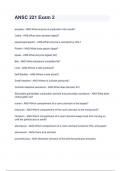Ansc 221 exam 2 4 - Study guides, Class notes & Summaries
Looking for the best study guides, study notes and summaries about Ansc 221 exam 2 4? On this page you'll find 19 study documents about Ansc 221 exam 2 4.
All 19 results
Sort by
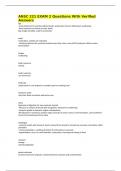
-
ANSC 221 EXAM 2 Questions With Verified Answers
- Exam (elaborations) • 17 pages • 2024
-
- $11.09
- + learn more
ANSC 221 EXAM 2 Questions With Verified Answers lips -most important for animals without hands, prehension (horse), sifting food, swallowing; -least important to chicken (no lips, beak) lips of pigs immobile, used for protection teeth mastication, particle size reduction -chewing important for ruminant animals-more they chew, more HCO3 produced, affects rumen fermentation tongue swallowing teeth carnivore tearing teeth omnivore can chew food teeth pig cheek tee...
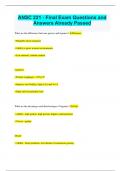
-
ANSC 221 - Final Exam Questions and Answers Already Passed
- Exam (elaborations) • 16 pages • 2024
- Available in package deal
-
- $9.99
- + learn more
ANSC 221 - Final Exam Questions and Answers Already Passed What are the differences between grasses and legumes? Grasses: • Palatable when immature • Ability to grow in most environments • Low mineral, vitamin content Legumes: • Protein roughages > 10% CP • Improve soil fertility, high in Ca and Vit A • High yield of palatable feed What are the advantages and disadvantages of legumes? Adv • Alfalfa - high quality, high protein, highest yield potential • Clo...
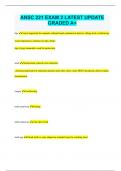
-
ANSC 221 EXAM 2 LATEST UPDATE GRADED A+
- Exam (elaborations) • 36 pages • 2024
- Available in package deal
-
- $10.99
- + learn more
ANSC 221 EXAM 2 LATEST UPDATE GRADED A+ lips -most important for animals without hands, prehension (horse), sifting food, swallowing; -least important to chicken (no lips, beak) lips of pigs immobile, used for protection teeth mastication, particle size reduction -chewing important for ruminant animals-more they chew, more HCO3 produced, affects rumen fermentation tongue swallowing teeth carnivore tearing teeth omnivore can chew food teeth pig cheek teeth w cone shaped o...
ANSC 221 Exam 2 (4)
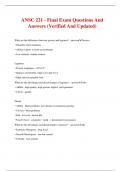
-
ANSC 221 - Final Exam Questions And Answers (Verified And Updated)
- Exam (elaborations) • 8 pages • 2024
- Available in package deal
-
- $11.49
- + learn more
ANSC 221 - Final Exam Questions And Answers (Verified And Updated) What are the differences between grasses and legumes? - answerGrasses: • Palatable when immature • Ability to grow in most environments • Low mineral, vitamin content Legumes: • Protein roughages > 10% CP • Improve soil fertility, high in Ca and Vit A • High yield of palatable feed What are the advantages and disadvantages of legumes? - answerAdv • Alfalfa - high quality, high protein, highest yield po...
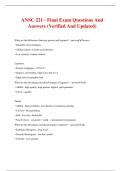
-
ANSC 221 - Final Exam Questions And Answers (Verified And Updated)
- Exam (elaborations) • 8 pages • 2024
- Available in package deal
-
- $11.49
- + learn more
ANSC 221 - Final Exam Questions And Answers (Verified And Updated) What are the differences between grasses and legumes? - answerGrasses: • Palatable when immature • Ability to grow in most environments • Low mineral, vitamin content Legumes: • Protein roughages > 10% CP • Improve soil fertility, high in Ca and Vit A • High yield of palatable feed What are the advantages and disadvantages of legumes? - answerAdv • Alfalfa - high quality, high protein, highest yield po...
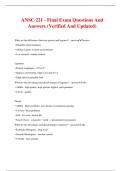
-
ANSC 221 - Final Exam Questions And Answers (Verified And Updated)
- Exam (elaborations) • 8 pages • 2024
- Available in package deal
-
- $11.49
- + learn more
ANSC 221 - Final Exam Questions And Answers (Verified And Updated) What are the differences between grasses and legumes? - answerGrasses: • Palatable when immature • Ability to grow in most environments • Low mineral, vitamin content Legumes: • Protein roughages > 10% CP • Improve soil fertility, high in Ca and Vit A • High yield of palatable feed What are the advantages and disadvantages of legumes? - answerAdv • Alfalfa - high quality, high protein, highest yield po...
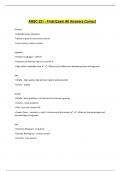
-
ANSC 221 - Final Exam All Answers Correct
- Exam (elaborations) • 10 pages • 2024
- Available in package deal
-
- $10.49
- + learn more
ANSC 221 - Final Exam All Answers Correct Grasses: • Palatable when immature • Ability to grow in most environments • Low mineral, vitamin content Legumes: • Protein roughages > 10% CP • Improve soil fertility, high in Ca and Vit A • High yield of palatable feed ️️What are the differences between grasses and legumes? Adv • Alfalfa - high quality, high protein, highest yield potential • Clover - quality Disadv • Alfalfa - bloat problems, not tol...
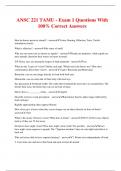
-
ANSC 221 TAMU - Exam 1 Questions With 100% Correct Answers
- Exam (elaborations) • 24 pages • 2024
-
- $14.49
- + learn more
ANSC 221 TAMU - Exam 1 Questions With 100% Correct Answers How do horses perceive stimuli? - answerVision, Hearing, Olfaction, Taste, Tactile stimulation (touch) What is olfaction? - answerthe sense of smell Why are our senses not as intense as equids? - answerPeople are predators, while equids are prey animals, therefore their senses are more in tuned. T/F: Horse eyes are among the largest of land mammals - answerTrue What are the 2 types of vision? Define each type. Which one(s) do hor...
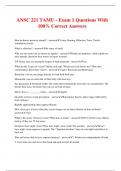
-
ANSC 221 TAMU - Exam 1 Questions With 100% Correct Answers
- Exam (elaborations) • 24 pages • 2024
- Available in package deal
-
- $13.49
- + learn more
ANSC 221 TAMU - Exam 1 Questions With 100% Correct Answers How do horses perceive stimuli? - answerVision, Hearing, Olfaction, Taste, Tactile stimulation (touch) What is olfaction? - answerthe sense of smell Why are our senses not as intense as equids? - answerPeople are predators, while equids are prey animals, therefore their senses are more in tuned. T/F: Horse eyes are among the largest of land mammals - answerTrue What are the 2 types of vision? Define each type. Which one(s) do hor...

Study stress? For sellers on Stuvia, these are actually golden times. KA-CHING! Earn from your study resources too and start uploading now. Discover all about earning on Stuvia

